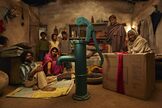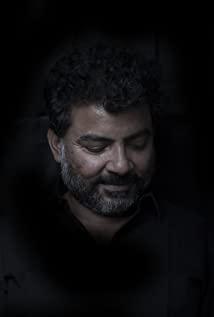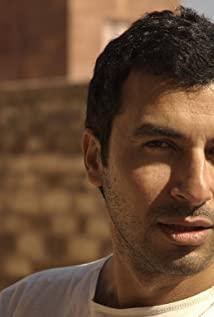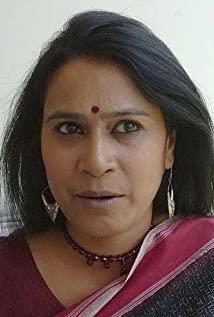Nata, the protagonist of the story, is probably the protagonist of the movie with the least dialogue. In the film, he just cringes and hides at one end of the corner. Usually, his elder brother speaks for him, and his elder brother decides everything for him. He lives a stupid life. Even if he commits suicide, he can sing love songs, step on shit, and laugh. How can such a simple person know that his decision to commit suicide has made the headlines in the news, alarmed the head of the headquarters, and even named a new policy after him. But all the flashy farce caused by suicide was a cloud in the end. After the noise, even the echo disappeared.
Since the news of Nata’s decision to commit suicide was reported by Le Kesh, a local reporter of the People’s Vanguard, and provided to the famous female reporters of Indian TV as an exclusive report, the media has completely joined the ratings competition. game. After the Indian TV report came out, the mainstream media all rushed to this little-known town in just a few hours and gathered in front of Nata’s house. It is ridiculous that every media is reporting on the spot the facts that they want to attract the audience's attention, not the real facts. Look at the pictures and add comments indiscriminately-there is only one purpose-ratings. Just as Kellers saw that a poor farmer was starved to death, he began to wonder, what exactly was the purpose of the media? What is the significance of such a live report? Is it to really save Nata? Or through Nata to save farmers who are below the poverty line like him? Or is it the audience rating that stays up all day to buy money?
Who would have thought that a live report of a poor farmer’s suicide would turn into a village’s way of making a living, and even the local people began to have income because of this incident, and the fantasy economy would develop as a result, and the suicide scene would be turned into a suicide scene? After the holiday celebration, no one, except Nata’s wife, really felt sad for Nata’s life or death...
Is the responsibility of the media to report and disclose the truth, or to pursue the results behind the truth? Is it for reporting? Or is there a way to solve the problem after the report? Just like the famous vulture and girl problem, do we need to reach out to save that girl? Still calmly taking the camera to record all this. If the facts we reported can save a group of people, then is the person who sacrificed rightly died heavier than Mount Tai? who are we? How can we who are not God have the right to determine the value of other people's life and death? How can one comment on whether a person is worthy of death? Is his death able to save others? If his death can really save his fellows, then must he be sacrificed? This is an eternal issue to be explored, because human nature is selfish. In fact, we have made a conclusion a long time ago, but we pretend to be reserved and say that this is a dilemma facing journalists.
How difficult is it actually? If you don’t even care about the person you can save by reaching out, how can you expect your report to be able to save others? Kellesh began to wonder why the starving farmer didn't matter? Isn't his life worth reporting? Why do people only care about the life and death of Nata? The female reporter pointed out clearly that because the ratings said that people like to see news about Natta, they can only report on Natta. So in the end, it’s the experience of Brother Xiao Liang that is the most correct: "Audiences, please put down the evil remote control in your hands."
Suddenly I thought of Jin Carey’s "Trumen's World", because people like to watch it. He had fooled Chu Men for a lifetime and made him appear in a reality show. After going around, the problem is still back to the original point. What are we caring about? Is it a problem of gloating at others or taking care of your own life? Because of people's curiosity and curiosity, how many people have staged such a farce-like reality show? We changed the channel and left when we saw it, but what about the people involved? What did they get?
Nata and her brother dreamed of getting a pension because of Nata's death, but in the end Nata was judged to have died accidentally without a pension. His wife asked very well, and now killed Nata, but in the end she didn't even have any money. From beginning to end, they were just pawns in this news campaign game, and they were forced to endure every move.
With a word from the general, thousands of generals are waiting to die...
Do the executors and managers
accept their fate, or do they have no power to resist?
Political power is a conspiracy of
the 80/20 rule
the responsibility and obligation to news reporters
people around for their own life and death of close friends attitude (although very sad, life still has to continue)
whirlwind appears, Canyun volume leaves the general's departure
Obviously he is the protagonist of the story, but when the finale ends, he finds that he is just a picture-in-picture.
The last thing we have is our torso.
View more about Peepli [Live] reviews


![Peepli [Live]](https://img.dogesflix.com/media/catalog/product/cache/bd935443df1c50537d4edaab4af5d446/300/360/imdb/title/cover/tt1447508/44ba40ca49a629aa71862afed172f668d33b5445.jpg)







